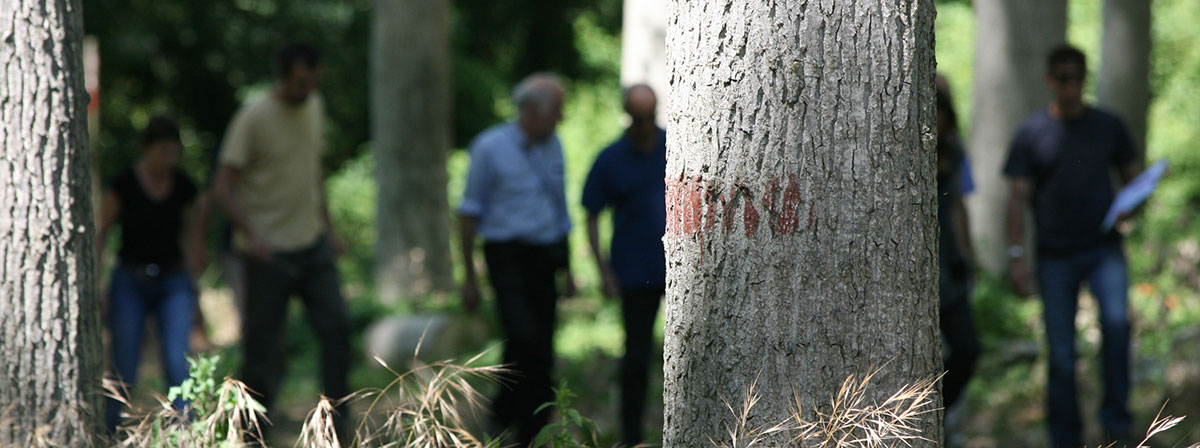Partnership
Technical and scientific partners
AGROOF SCOP - www.agroof.net
Team
- Camille Béral – Research & Development
- Sébastien Dulieu – Administrative and financial manager
- Nicolas Girardin – Audiovisual production
- Pierrick Gouhier – Trainer and advisor
- Hélène Le Gallic – Web development
- Fabien Liagre – Research & Development
- Antoine Marin – Trainer and advisor
- Ambroise Martin-Chave – Research & Development
- Daniélè Ori – Trainer and advisor
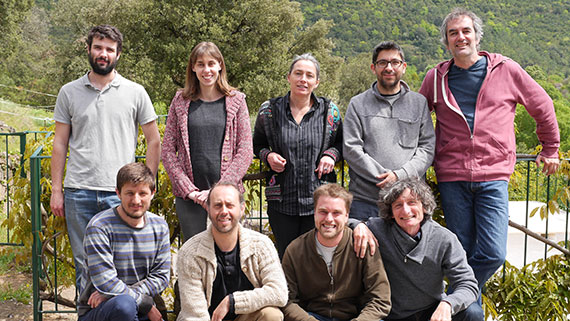
Description
AGROOF is a research office specialized in agroforestry research and development in France and Europe, for and with farmers, students and communities. Its purpose is to make the link between research and the field, in a process of participatory research and knowledge sharing. Founded in 2005, Agroof is a cooperative and participative society (SCOP) of 9 people since 2013.
Actions :
- Research and Development
- Training for farmers, technicians, students
- Advice and support for farmers and communities
- Communication and dissemination for all
Role in the current project
Coordination / ResponsAble for Microclimate, Vegetable, Biodiversity and Economy actions.
Co-organizers and co-director of agroforestry market gardening courses based on the research results.
Domaine de Roumassouze - www.roumassouze.fr
Team
- Denis Florès - farmer
- Virginie Florès - farmer
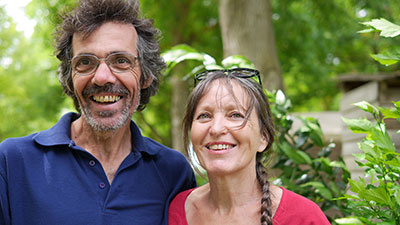
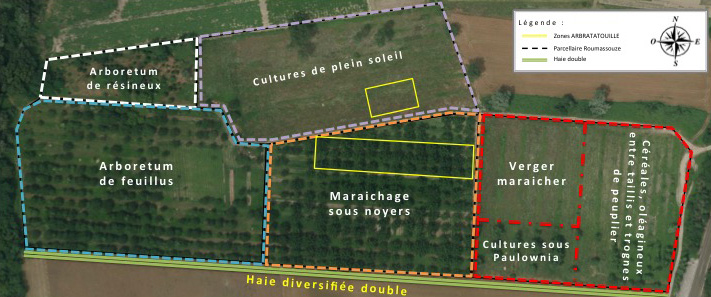
Description
The farm of Vézénobres are among the oldest agroforestry systems in France. The trees were planted by INRA in 1996 as part of an experiment that lasted 12 years. Denis and Virginie settled in 2010, delighted with the opportunity to acquire 11ha of land with trees well developed. They immediately started agroforestry market gardening and cereal, under organic certification. For them, trees contribute to the fertility of their soil, the maintenance of biodiversity and the production of wood and rameal chipped wood.
Today, the farm is 11 ha where different agroforestry systems mix :
- 2 ha of hybrid walnuts arranged in 10m x 10m of which 0.8 ha with market gardening
- 4 ha of an arboretum of a dozen different hardwoods
- 0.33 ha of orchards set up in 2014
- 0.85 ha of full-field market gardening
- 2.5 ha of field crops
- 1.43 ha of various hedges and riparian forests
The objectives of the exploitation
- To ensure the profitability of the exploitation and to live fully and serenely of their activity: limited investments, optimization of the productions per unit of surface
- Being autonomous and independent: farmers' seeds, processing workshop, few external inputs
- Share their activity and pass on their passion: direct sales, training, group reception
- Managing natural resources: herbal treatment, minimum tillage
Role in the project
Involved in various research and development projects in collaboration with AGROOF, and curious about the functioning of agroforestry systems, they agreed to share a part of their fields (6000 m²) for the experiments conducted in ARBRATATOUILLE. This experiment was put in place in 2015. It includes a control without trees (full sun) and three agroforestry treatment each corresponding to a different tree crown management.
Experimental design
In each of the treatment, there is a tomato crop, a lettuce crop and a carrot crop in rotation from one year to another. Each modality is separated from another by another crop (wheat, potato ... etc.) to avoid interference. Each crop area measures 25 x 10m. The trial is oriented North-South and the tree line is left in spontaneous vegetation. The establishment and maintenance of vegetable crops linked to the ARBRATATOUILLE experiment is the responsibility of Denis and Virginie Flores who are paid for their time spent. The monitoring protocols are carried out by the other project partners.
The 4 treatments
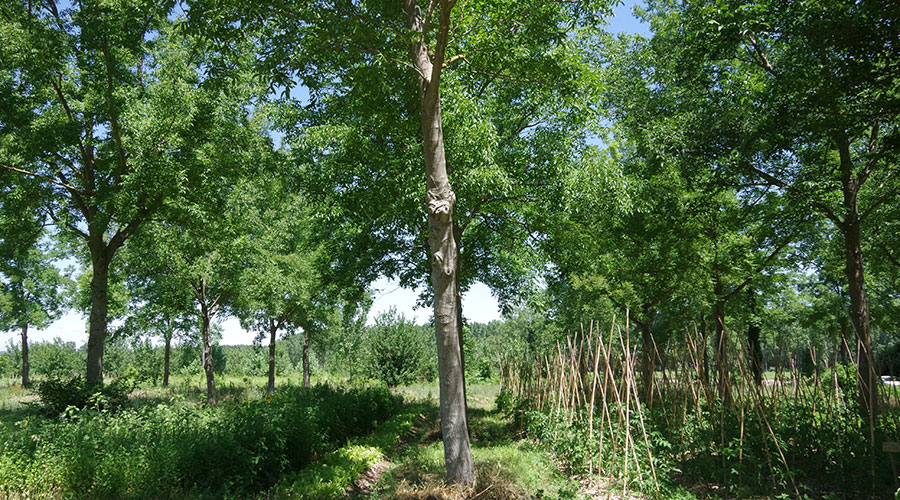
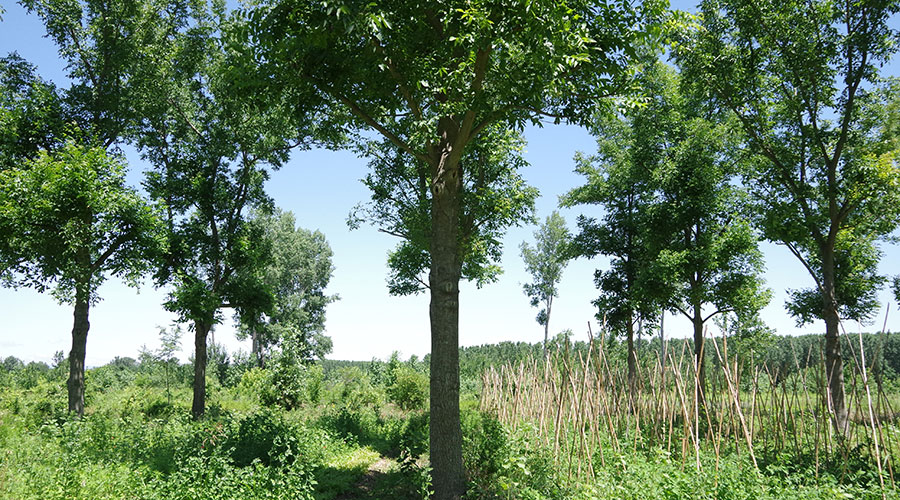
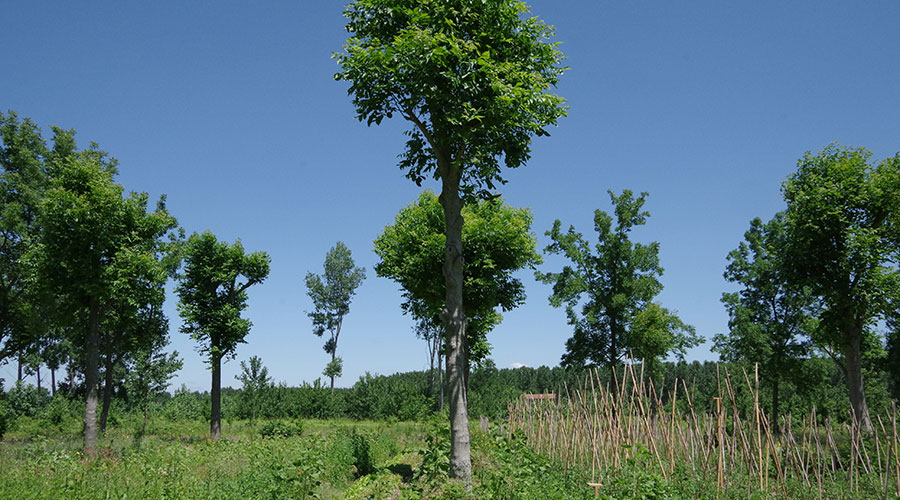
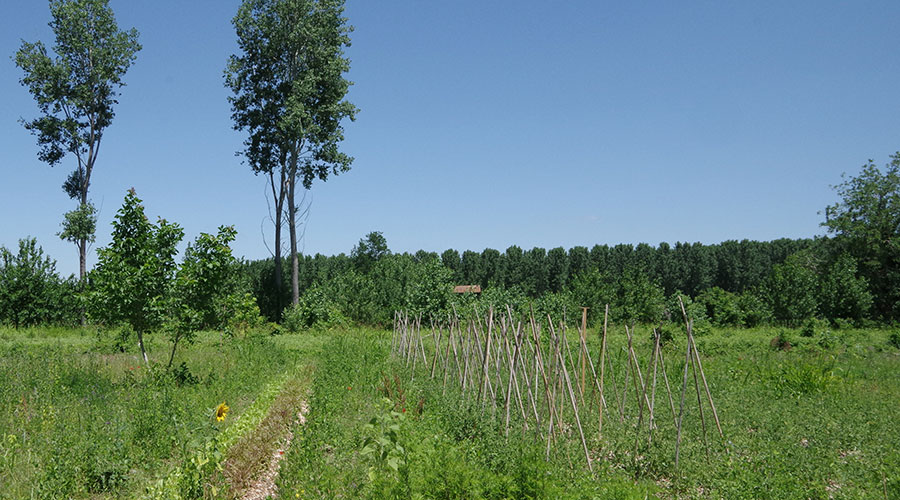
Boulidou Farm - www.fermeleboulidou.com
Team
- Sonia Guérin - farmer
- Benoit Guérin - doctor

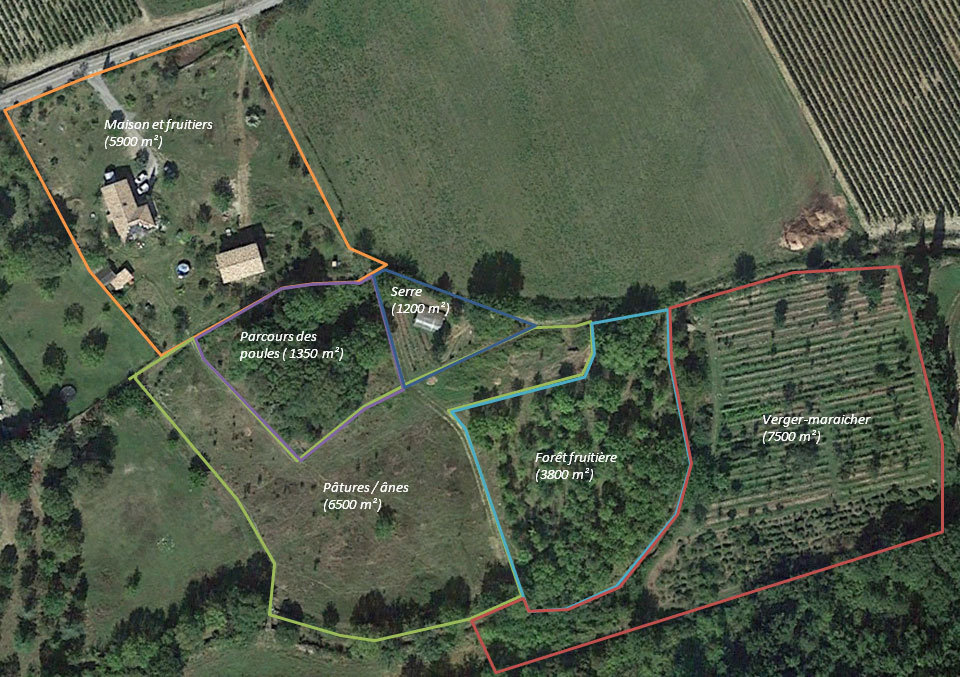
Description
Sonia, initially specialized in the production and control of seeds (GEVES) and Benoît, doctor, initiate their installation in 2011, motivated by their commitment to a healthy diet and respectful of nature. The lands on which they settle are old vines abandoned for 20 years. The old rows of vines have delimited the shallow bed for vegetable crops, and the ash forest was converted into a fruit forest, because of the desire to combine pre-existing natural elements and agricultural products. The market gardening orchard is the main unit of production, but the other unit (donkey, laying hens, ducks, and fruit forest) each play a vital role in the overall functioning of the farm.
Fruit and vegetable production is mainly provided by the vegetable garden orchard (7,500 m²), supplemented recently by the fruit forest (3,400 m²); a small greenhouse of 35 m² also produces plants, mainly tomatoes and some crops in spring and autumn (salad, radish, spinach).
Vegetable crops include about thirty different vegetables. The fruit trees include a dozen species: apricot, jujube, cherry, apple, peach, plum, mulberry, hazel, persimmon, minnow, pomegranate and fig tree. The breeding is also practiced with a meadow of 6,500 m² welcoming donkeys whose composted manure is used on the market garden mounds. A course of 1350 m ² for laying hens allows to diversify the product offer and of to use manure as nutrients source for vegetable crops. The farm is surrounded by hedges, acting as buffer against climate excess (floods in particular), and as biodiversity shelter.
The objectives of the exploitation
The whole is cultivated and managed according to a permacultural approach with the following objectives: to ensure the profitability of the farm respecting nature and shaping their living environment; produce a variety of tasty, healthy and quality products for local market; to raise public awareness of organic and local agriculture.
Role in the project
Sonia Guérin wants to get involved in research projects such as ARBRATATOUILLE to find answers to her questions and technical support. She actively participates in discussion meetings on the project's orientations, results, and brings her experience as a trainer in the project training courses.
Experimental aspects
On this site the experimental approach is limited. The research aspects focus on production levels, crop management, and the overall performance of the system.
It is also planned to conduct a systemic analysis of the performance of his farm in 2018.
Overview of the farm
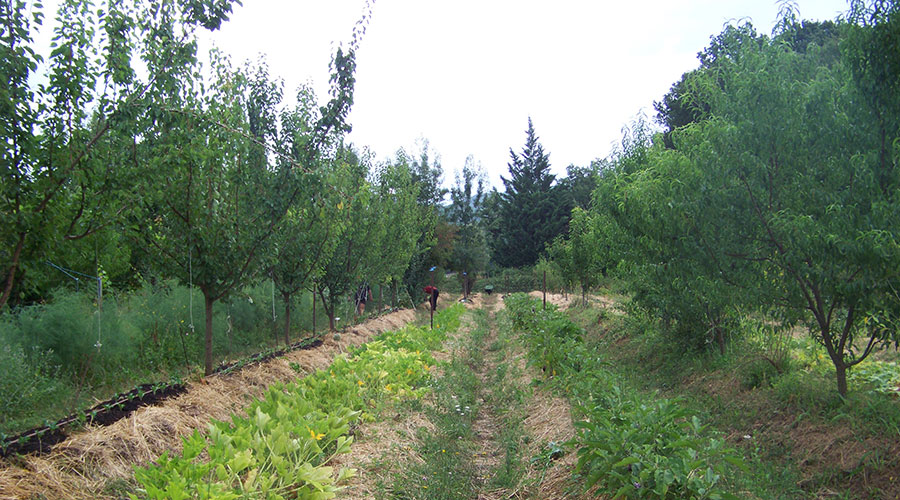
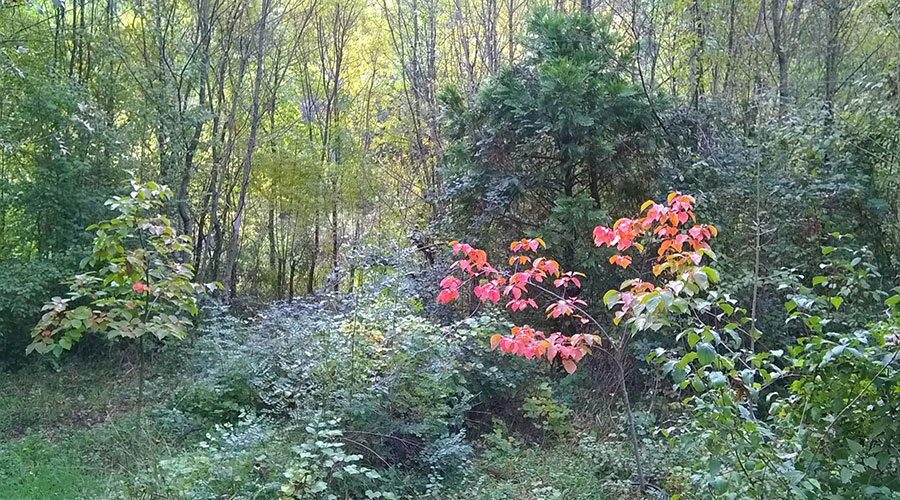
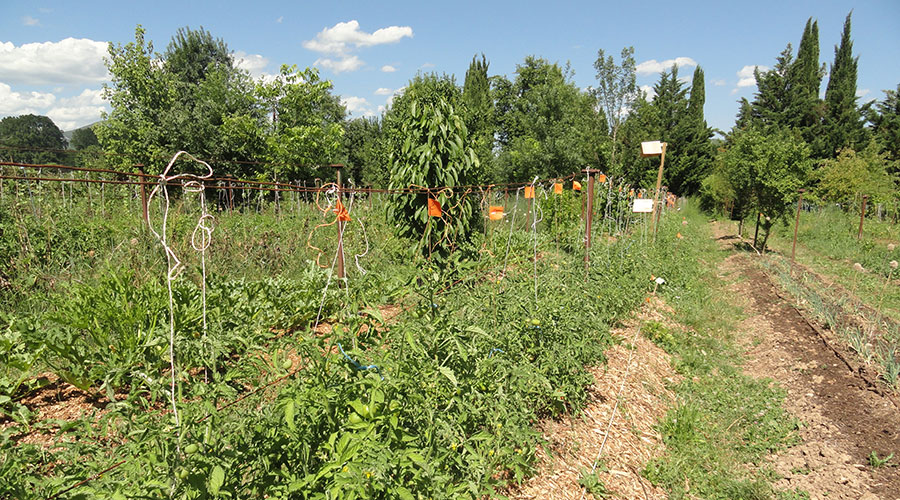
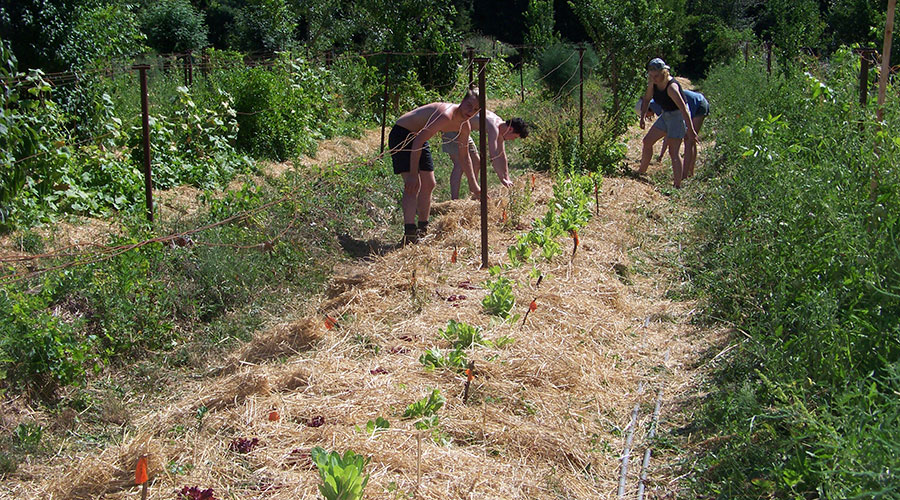
Le jardin d'Odile
Team
- Odile Sarrazin - agricultrice
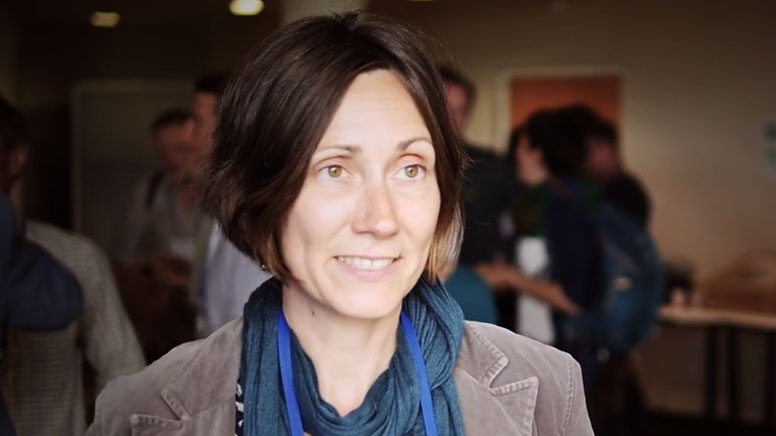
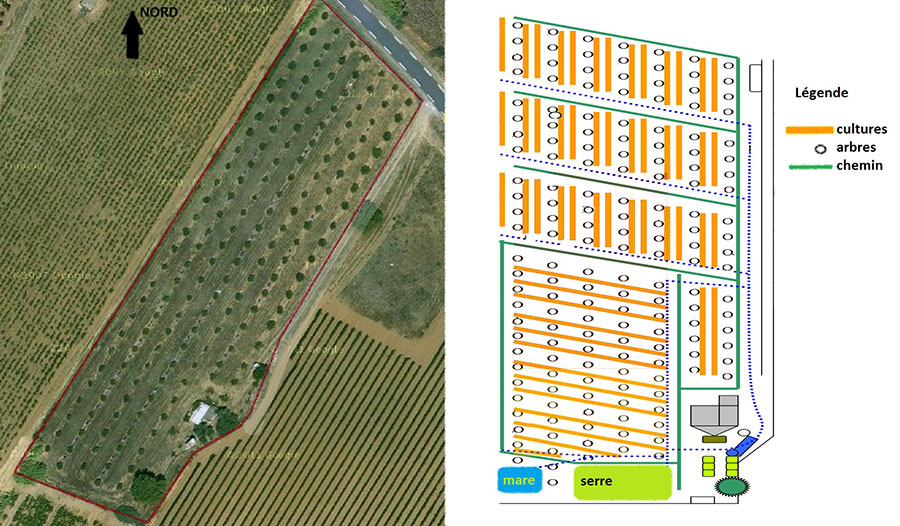
Description
After 7 to 8 years working as a farm worker, Odile decided to set up as a market gardener. In 2010 she found a land planted with ten years olive trees. The agroforestry system imposed itself and implied optimization of production on a small surface.
The farm is an agroforestry system associating vegetable crops and olive trees on 0.72 ha in organic agriculture. The olive trees are arranged in 6x6m and were planted within the years 1999 and 2000.
Vegetable crops are diversified (about ten: tomatoes, onions, salads, peas, beans, chard, spinach, garlic, radish, carrots, turnips) and are planted in rows between the rows of olive trees.
The tree lines follow two orientations: NE-SO and NO-SE.
The objectives of the exploitation
Her objectives are mainly:
- to ensure the profitability of the farm while respecting the environment through responsible practices
- to produce a variety of tasty and quality products
- share experiences and knowledge during social and educational activities
Role in the project
Odile actively participated in the discussion meetings on the project orientations, the results, and brought her experience as trainer in the framework of our trainings.
However, due to a change of professional activity in 2017, she had to drastically reduce its market gardening activity and could not fully participate in the ARBRATATOUILLE project..
Experimental design
On this site the experimental approach was very small. The focus has been placed on the production levels, technical itineraries and overall performance of the system.
Overview of the agroforestry system
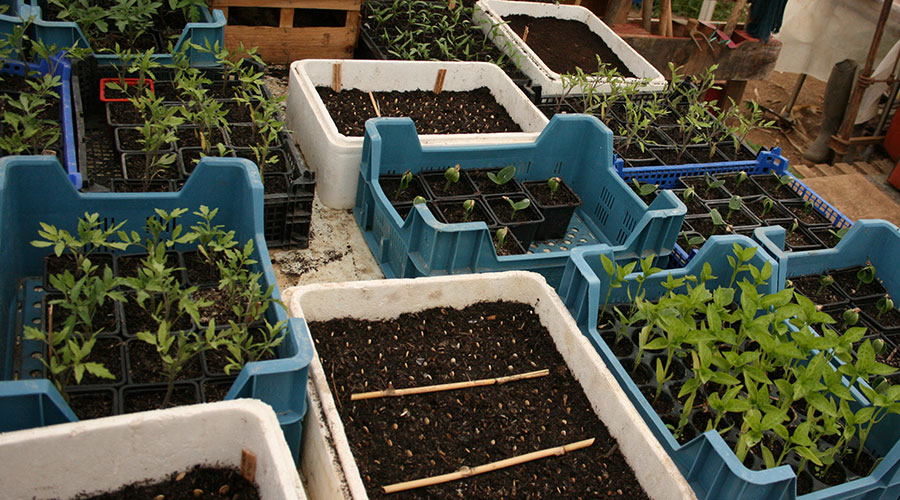
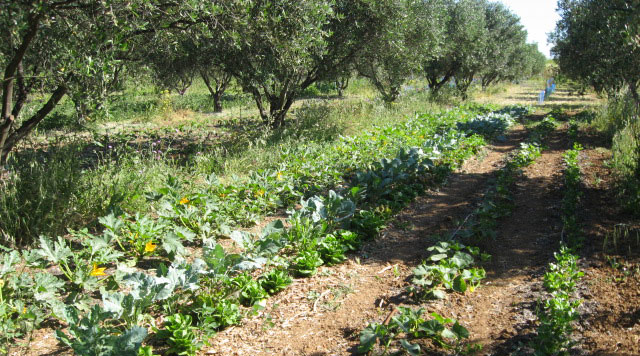
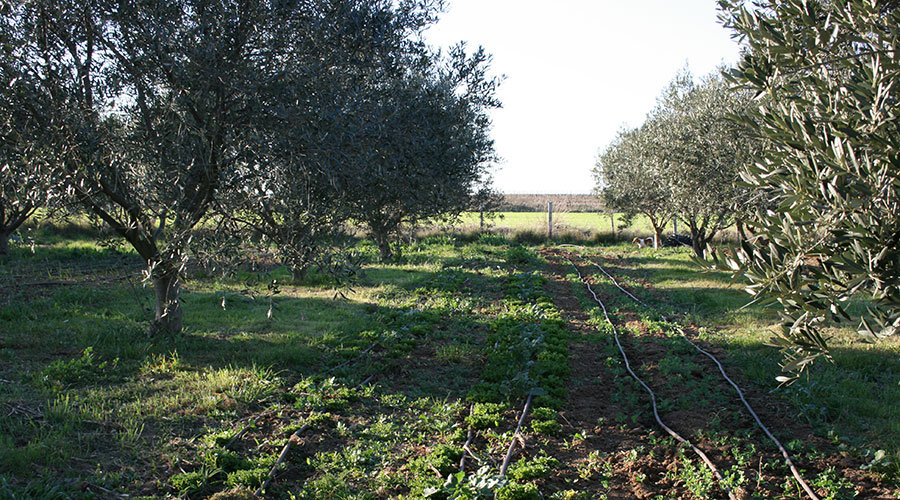
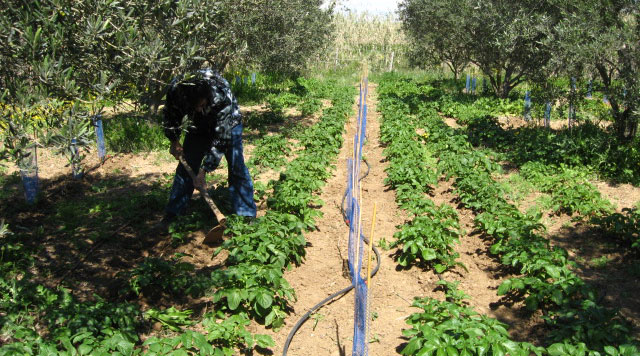
UMR ECO&soilS – Montpellier - www.umr-ecosoils.fr
Team
- Philippe Hinsinger - INRA researcher
- Isabelle Bertrand - INRA researcher
- Claire Marsden - SupAgro- Senior Lecturer
- Camille d’Hervilly - PhD Student INRA
Description
The UMR Eco & Soils "Functional Ecology & Soil Biogeochemistry & Agroecosystems" studies the biogeochemical cycles of carbon and nutrients (especially N and P), and their coupling in Mediterranean and tropical agroecosystems. The aims of the research carried out in the UMR are to propose, based on scientific knowledge, agroecological practices dedicated to the maintenance and improvement of agricultural and environmental functions of agroecosystems.
Role in the project
This team is mainly involved in action 2, and more specifically on the study of soil fertility.
UMR EMMAH – INRA Avignon - www.paca.inra.fr/emmah
Team
- Yvan Capowiez – researcher
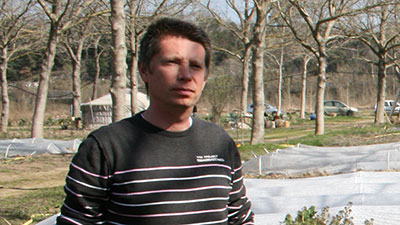
Description
The unit's goal is to develop tools for analysing and forecasting the dynamics of the biophysical functioning of ecosystems on a territorial scale. In particular, these tools should make it possible to better understand the feedback loop between the various modes of occupation of the surface, the agricultural practices, the climatic forcing and the water cycle in quantity and quality, and on agricultural production.
Role in the project
Involved in the SOIL action and the BIODIVERSITY action, Yvan Capowiez focuses more particularly on the effect of soil use on earthworms diversity, activity and functional aspects.
UMR AMAP – CIRAD Montpellier - www.amap.cirad.fr
Team
- Jean Dauzat - researcher in TLS data analysis and modeling
- Cécile Madelaine Antin - Postdoctoral researcher in morphometrics and databases
Description
It is a Joint Research Unit (UMR) with 5 trustees, attached to CIRAD, CNRS, INRA, IRD and Montpellier University. Its scientific project is based on three research axes: "Plant Biodiversity, current and past", "Biomass and production of plants and vegetation" and "Modeling of the plant world". Within the second axis, the theme "3D structure and dynamics of forests" is specifically concerned with the characterization of forest canopies (among others by terrestrial or airborne lidar) in order to quantify volumes of wood, crown shapes and leaf area densities.
Role in the project
Involved in MICROCLIMATE action
UMR IMBE – Université Avignon - www.imbe.fr
Team
- Dr. Christophe Mazzia - Senior Lecturer
Description
The IMBE analyzes marine and continental biological systems, with a special focus on biodiversity and ecosystem functioning. The goal is to improve the conservation and management of natural resources in the face of global change.
Role in the project
Involved in the BIODIVERSITY action
UR PSH – INRA Avignon - www.paca.inra.fr/psh
Team
- Hélène Gautier - Researcher
- Gilles Vercambre - Researcher, Ecophysiologist and Modeler
- Laurent Gomez - Head of Biochemical Analysis Laboratory
- Doriane Bancel - Planning of samples and biochemical analyzes
- Sylvie Sérino, Emilie Rubio, Patricia Laugier - Sample preparation and biochemical analysis
- François Lecompte - Researcher
- Guillaume Garcia et Valérie Serra - Training of trainees in ecophysiological measures for monitoring the growth of market gardening plants
- Odile Mascle - Technician - sentinel prey farm
Description
The mission of the PSH unit is to contribute, through ecophysiology and agroecology approaches, to the development of fruit and vegetable growing systems and landscape scenarios in the Mediterranean area in order to improve the quality of harvested products and respect for the environment.
Its objectives are
- Understand and quantify the impact of agricultural practices, landscape organization and environmental factors on the functioning of the plant and its organs, as well as on pest and crop auxiliary populations
- Develop eco-physiological and ecological models to analyze the complexity of the systems studied and evaluate their performance at different scales
- Design on these bases technical and landscape scenarios adapted to integrated production.
Role in the project
Involved in the action VEGETABLES and especially quality analysis
UMR G-EAU – IRSTEA Montpellier - www.irstea.fr/g-eau
Team
- Cyril Dejean - Engineer - Specialist in metrology: water flow, water balance
- Bruno Cheviron - Research Associate - Using data to model flows
Description
The core of the UMR G-EAU project is the understanding of the functioning of socio-hydrosystems both in current operation and in times of crisis or high tension (shortage, flood, pollution). They analyze the hydrological, technical, social, economic and political processes within a water-related territory and their consequences. They also mobilize their interdisciplinary strength to analyze the combined effects of these processes, and ultimately identify opportunities for governance and adaptation in a complex and uncertain environment. The project includes the design and testing, in interaction with the civil society, of tools and devices to reveal the functioning of these systems and to intervene on their trajectory.
Role in the project
Responsable for the SOIL action ("water" component)
Financial partners
Fondation de France www.fondationdefrance.org/fr/agroforesterie
Description
With nearly 50 years of experience, the Fondation de France is the leading philanthropy network in France. It brings together founders, donors, volunteer experts, employees and thousands of associations, all committed and driven by the will to act. Thanks to its actors located throughout France, in rural areas or in cities, it is in direct contact with local issues.
Fondation Picard www.fondationdefrance.org/fr/fondation/fondation-picard
Description
The Picard Foundation is committed to the respect of the environment and the promotion of a healthy diet, and more particularly to the development of knowledge and practices in favor of new modes of ecological agricultural production such as permaculture or agroecology .
Fondation Terra Symbiosis www.terra-symbiosis.org
Description
The Terra Symbiosis Foundation was created in 2009 by Patricia Jung-Singh, under the aegis of the Fondation de France. It is thus recognized as being of public utility and its vision is to restore the link between Man and Nature. The foundation aims to support projects in the environment, vectors of social development, economically viable and protecting natural resources and biodiversity. Agriculture has quickly emerged as a bridge between these different aspects, enabling people to work and sovereignty while respecting the land and ecosystems. If the first years, the foundation has supported projects abroad, it has been focusing since 2013 in France and Alsace, where it is located..
Fondation Humus www.fondation-humus.com
Description
Created in 2011 by members of the Dumont family, actors and promoters for 30 years of the development of organic agriculture, eco-construction and eco-medicines, the Humus Foundation aims to :
- The protection of biodiversity, the fauna and flora environments, the man remaining at the heart of the projects,
- Support to associations and stakeholders committed to the protection of the environment and ecosystems in France and abroad,
- Contribution to reflection on the commitment of our societies to sustainable lifestyles.
